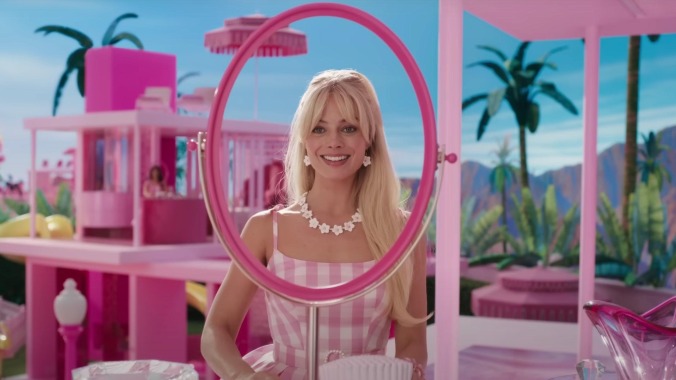Barbie review: A pink, plucky, and poignant rumination on womanhood
Margot Robbie and Ryan Gosling play iconic Mattel dolls facing an existential crisis in Greta Gerwig's terrific high-concept comedy

In 1959, a mere 64 years before the release of Greta Gerwig’s Barbie, Mattel’s signature doll hit store shelves for the first time and quickly became a Rorschach test for many girls and women as they transposed their own identity onto a plastic plaything. The small-scale doll was created by company co-founder Ruth Handler—pulling inspiration from Germany’s Bild Lilli doll—as a way to empower girls like her daughter Barbara (the brand’s namesake) to use their imagination in creating limitless worlds where they can be and do anything they want. It revolutionized play patterns for pint-sized consumers who weren’t just seeking the pretend solace of motherhood and domesticity. Yet for some adults, this tiny wonder represented an unattainable, manufactured version of perfection, subsequently transforming her into a lightning rod for controversy and feminist critique.
Nevertheless, Barbie persisted, blessedly changing with the increasingly enlightened times, diversifying her size and skin tone to become a more inclusive toy line. Co-writer and director Greta Gerwig repackages these goods in Barbie, her hilarious and heartfelt homage to the brand. By lovingly lampooning corporate missteps along with celebrating the successes, the film’s self-effacing humor, out-of-the-box smarts, and emotional potency strike the right tone. Gerwig and her creative collaborators—including co-writer Noah Baumbach—not only give the formerly inanimate figure a sparkling personality and a pastel-shellacked pop-art playground, they also deliver genuinely meaningful sentiments surrounding the complexities of gender politics. It’s the year’s best tear-jerking, thought-provoking comedy.
Stereotypical Barbie (Margot Robbie) has always had the quintessential Best Day Ever. She’s awakened each morning by a song (Lizzo’s “Pink” provides her daily mojo), dines on perfect meals, wears the cutest fashions, and hangs out with her fellow Barbies (played by Issa Rae, Hari Nef, Emma Mackey, Alexandra Shipp, and Nicola Coughlan) and Kens (played by Ryan Gosling, Simu Liu, Kingsley Ben-Adir, and Scott Evans). There’s also Ken’s friend Allan (Michael Cera) and Barbie’s pregnant friend Midge (Emerald Fennell), whose presence is purposeful even though their dolls were both discontinued. In the plastic fantastic Malibu-meets-Miami enclave of Barbie Land, all jobs are held by women while the men exist to frolic on the beach and the dance floor. It’s a fantasy utopia without walls or negativity.
That is until Stereotypical Barbie begins suffering from the throes of an existential crisis manifested in the form of bad breath, too-cold showers, flat feet, and pervading thoughts of death. Hoping for a quick fix, she pays a visit to Weird Barbie (Kate McKinnon), a spiky-haired, shaman-like Barbie that’s been “played with too hard.” Weird Barbie advises her to go into the Real World to find the person playing with her in doll form and cheer them up so life can return to normal. However, when Stereotypical Barbie and a stowaway Ken (Gosling) arrive in Southern California, they face fish-out-of-water hijinks while dealing with humans’ dysfunctional nature stemming from patriarchal toxicity, loss of adolescence, and adult disillusionment.
 Keep scrolling for more great stories.
Keep scrolling for more great stories.
